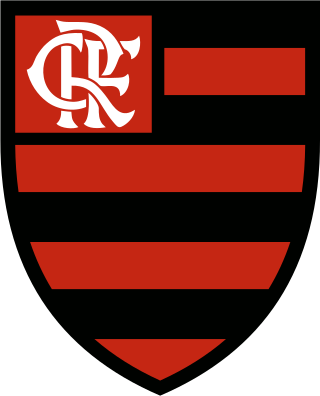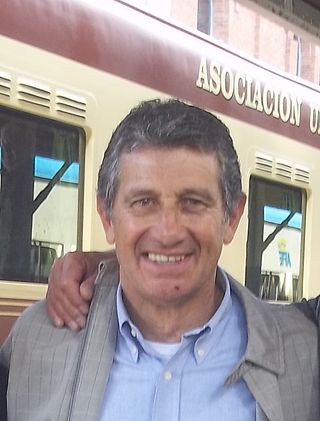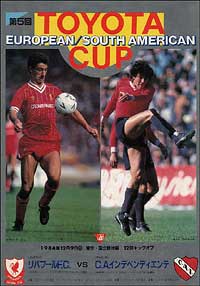
Clube de Regatas do Flamengo, more commonly referred to as simply Flamengo, is a Brazilian sports club based in Rio de Janeiro, in the neighborhood of Gávea, best known for their professional football team that plays in Campeonato Brasileiro Série A, as well as Campeonato Carioca. They are one of two clubs to have never been relegated from the top division, the other being São Paulo.
The Intercontinental Cup, also known as the Toyota European/South American Cup for sponsorship reasons, from 1980 to 2004, was an international football competition endorsed by UEFA (Europe) and CONMEBOL, contested between representative clubs from these confederations, usually the winners of the UEFA Champions League and the South American Copa Libertadores. It ran from 1960 to 2004, when it was succeeded by the FIFA Club World Championship, although they both ran concurrently in 2000.

Arthur Antunes Coimbra, better known as Zico, is a Brazilian football coach and former player who played as an attacking midfielder. Often called the "White Pelé", he was a creative playmaker, with excellent technical skills, vision and an eye for goal, who is considered one of the most clinical finishers and best passers ever, as well as one of the greatest players of all time. Arguably the world's best player of the late 1970s and early 80s, he is regarded as one of the best playmakers and free kick specialists in history, able to bend the ball in all directions. By one estimate, Zico is the player that scored the most goals from direct free kicks, with 101 goals.
The FIFA Club World Cup is an international men's association football competition organised by the Fédération Internationale de Football Association (FIFA), the sport's global governing body. The competition was first contested in 2000 as the FIFA Club World Championship. It was not held from 2001 to 2004 due to a combination of factors in the cancelled 2001 tournament, most importantly the collapse of FIFA's marketing partner International Sport and Leisure (ISL), but since 2005 it has been held every year. Views differ as to the cup's prestige: it struggles to attract interest in most of Europe, and is the object of heated debate in South America.

Paulo César Carpegiani is a Brazilian retired footballer who played as a midfielder.
José Leandro de Souza Ferreira, known as Leandro, is a Brazilian former footballer who played as a defender.
Adílio de Oliveira Gonçalves, usually known simply as Adílio, is a Brazilian former professional footballer who played as a midfielder. He made two appearances for the Brazil national team.

José Carlos Nepomuceno Mozer is a Brazilian former professional footballer who played as a central defender, and is a manager.
The 1981 Copa Libertadores was won by Flamengo of Brazil, who beat Cobreloa of Chile in the finals.

Fernando Morena Belora is a Uruguayan former professional footballer who played as a striker. His most known nicknames were "Nando"(abridged form of Fernando) and "Potrillo", and he is the all-time top goal scorer in the history of the Uruguayan Primera División with 230 goals in 244 games. He scored 268 in his almost 20-year career.

The 2005 FIFA Club World Championship final was an association football match played between São Paulo of Brazil, the CONMEBOL club champions, and Liverpool of England, the UEFA club champions, on 18 December 2005 at the International Stadium Yokohama, Japan. It was the final match of the 2005 FIFA Club World Championship, a competition for the winners of the primary cup competitions of FIFA's continental members. The Club World Championship replaced the Intercontinental Cup, which both teams had competed in before. São Paulo had won the Intercontinental Cup twice in 1992 and 1993, while Liverpool had lost twice in 1981 and 1984.

The 1984 Intercontinental Cup was an association football match between Liverpool of England and Independiente of Argentina on 9 December 1984 at the National Stadium in Tokyo, Japan, the annual Intercontinental Cup contested between the winners of the Copa Libertadores and European Cup. Independiente were appearing in their sixth Intercontinental Cup, they had won the competition once in 1973 and lost the other four. Liverpool were making their second appearance in the competition, after their loss in 1981.

The rivalry between Flamengo and Atlético Mineiro is a footballing rivalry played between Brazilian clubs Clube de Regatas do Flamengo, from Rio de Janeiro, and Clube Atlético Mineiro, from Belo Horizonte. The clubs first played against each other in 1929, but until regular competitions were introduced in Brazilian football in 1959, the encounters were played at friendly level, since they come from different states: Flamengo is from Rio de Janeiro, while Atlético Mineiro hails from Minas Gerais. The rivalry developed in the 1980s from numerous controversial encounters between the two clubs in that decade's Brasileirão and Copa Libertadores editions. It remained through the following years, and is considered the biggest interstate rivalry in Brazilian football.
The involvement of Clube Atlético Mineiro in international club football began in 1972, the year of its first appearance in an official competition at that level. Since then, the Brazilian club, based in Belo Horizonte, Minas Gerais, has participated in 31 continental and one intercontinental tournament. Atlético Mineiro has won four official titles at the international level: the Copa Libertadores in 2013; the inaugural edition of the Copa CONMEBOL in 1992, and again in 1997; and the Recopa Sudamericana in 2014. In addition, the club finished as runner-up of the Copa CONMEBOL in 1995, the Copa de Oro in 1993, and the Copa Master de CONMEBOL in 1996.
The 1981 football season is Clube de Regatas do Flamengo's 86th year of existence, their 70th football season, and their 69th season in the top division of the Campeonato Carioca, the Rio de Janeiro state football league. In addition, it is their 11th in the top division of the Brazilian national football league, having never been relegated from either. Internationally, Flamengo participated in the 1981 Copa Libertadores, qualifying through winning the 1980 Brazilian Série A Championship.

The 2019 FIFA Club World Cup final was the final match of the 2019 FIFA Club World Cup, an international club association football tournament hosted by Qatar. It was the 16th final of the FIFA Club World Cup, a FIFA-organised tournament between the club champions from each of the six continental confederations, as well as the host nation's league champions.
Antônio Nunes, better known as Lico is a Brazilian former professional football player and manager who played as a midfielder and striker. He was a club icon for Brazilian football clubs Joinville and Flamengo, winning the 1981 Copa Libertadores and Intercontinental Cup with the latter.
Mário Caetano Filho, better known as Marinho is a Brazilian former professional football player who played as a centre-back. He is most well-known for his time at Flamengo beginning in 1980.









